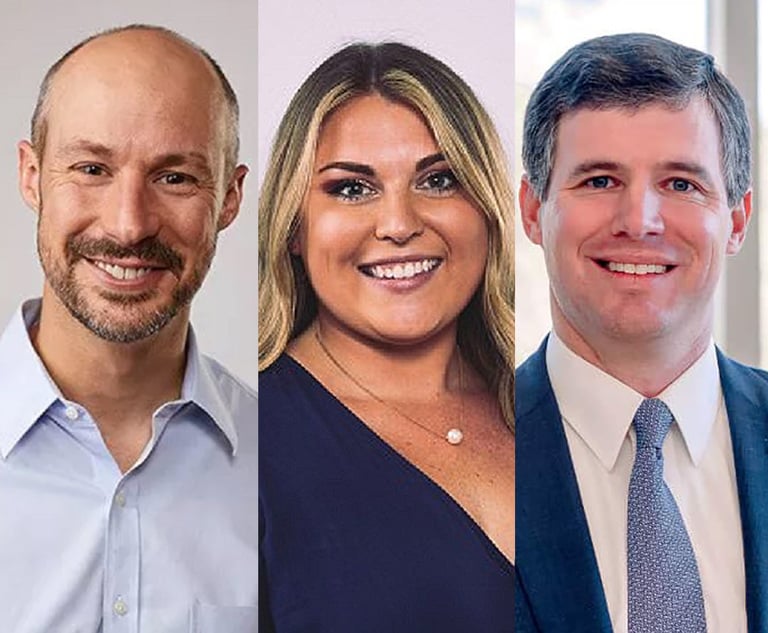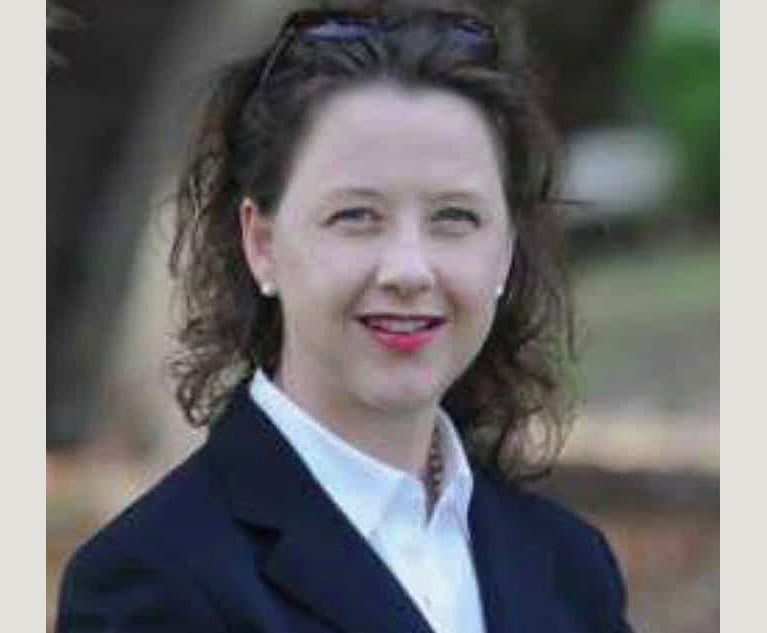Judge Finds Ga. Elections at Risk of Hacking, Declines to Order Paper Ballots
Judge Totenberg warned Georgia's election officials that further delay addressing the challenges facing the state's election system are not tolerable.
September 18, 2018 at 09:11 AM
6 minute read
 Judge Amy Totenberg, U.S. District Court for the Northern District of Georgia
Judge Amy Totenberg, U.S. District Court for the Northern District of Georgia
Calling a proposal to bar use of Georgia's antiquated computer voting machines by the midterm election a “true Catch-22,” a federal judge in Atlanta decided Monday night that the state may continue using its touchscreen machines, rather than convert to paper ballots in time for the Nov. 6 midterm election.
Judge Amy Totenberg of the U.S. District Court for the Northern District of Georgia said that, although Georgia's voting system installed in 2002 “poses a concrete risk of alteration of ballot counts” that could affect the vote, “the eleventh-hour timing” of the request to immediately return to paper ballots “could just as readily jeopardize the upcoming election, voter turnout, and the orderly administration of the election.”
But Totenberg warned Georgia's election officials, who are defendants in the suit, that further delay addressing the challenges facing the state's election system are not tolerable.
“The state's posture in this litigation—and some of the testimony and evidence presented—indicated that the defendants and state election officials had buried their heads in the sand,” she said.
In her order, Totenberg chided Secretary of State Brian Kemp, who is the Republican candidate for governor, and members of the State Board of Elections for having “delayed in grappling with the heightened critical cybersecurity issues of our era posed [by] the state's dated, vulnerable voting system.” That includes using an election system with outdated software and voting machines that have no paper trail to verify a vote is accurately recorded both when it is cast and when it is tallied.
But the judge also scolded counsel for the plaintiffs—four Georgia voters and a Colorado-based nonprofit organization—for waiting until last month to seek a court order forcing a return to paper ballots.
Totenberg said the delay deprived her of sufficient time “to allow for thoughtful, though expedited, remedial relief, despite the important, substantive content” of supporting evidence that the state's election infrastructure is unreliable and highly vulnerable to manipulation by hackers.
“There are no easy answers to the conflicts posed here,” she said. “In a democracy, citizens want to be assured of the integrity of the voting process, that their ballots are properly counted and not diluted by inaccurate or manipulated counting, and that the privacy of their votes and personal information required for voter registration is maintained.”
“But citizens also depend on the orderly operation of the electoral and voting process,” she continued. “Last minute, wholesale changes in the voting process operating in over 2,600 precincts, along with scheduled early voting arrangements, could predictably run the voting process and voter participation amuck.”
The judge also warned Kemp and the elections board that a threat to the integrity of elections would break citizens' confidence in the system.
“Advanced persistent threats in this data-driven world and ordinary hacking are unfortunately here to stay,” Totenberg wrote. “Defendants will fail to address that reality if they demean as paranoia the research-based findings of national cybersecurity engineers and experts in the field of elections. Nor will surface level audit procedures address this reality when viruses and malware alter data results and evade or suppress detection.”
Totenberg said that both sides indicated the case “is headed for immediate appeal.”
“But if the case stays with or comes back to this court, the Court will insist on further proceedings moving on an expedited schedule,” she said. “The 2020 elections are around the corner. If a new balloting system is to be launched in Georgia in an effective manner, it should address democracy's critical need for transparent, fair, accurate, and verifiable election processes that guarantee each citizen's fundamental right to cast an accountable vote.”
Atlanta attorney Bruce Brown, one of several lawyers representing the Coalition for Good Governance, called Totenberg's decision “broadly consistent with the positions that the coalition is taking in the case—particularly the urgent need for Georgia, as soon as feasible, to switch to paper ballots.”
Brown's co-counsel, Seattle attorney Robert McGuire, said that, while disappointed the outdated touchscreen voting machines will remain in use through November, “the case can now move forward on the merits. We will continue to press these voting rights claims, and we fully expect to prevail in the end.”
Citing alarms raised by national security officials last summer that the election infrastructure of states, including Georgia, have already been targeted—and possibly compromised—by hostile nation hackers, the Coalition for Good Governance allied with Georgia voters to sue for a return to paper ballots.
But former Democratic Gov. Roy Barnes, who with partner and son-in-law John Salter Jr. is defending Kemp and the elections board, countered that arranging for a paper ballot election for more than six million registered voters before early voting begins on Oct. 15 would quickly devolve into chaos. At the hearing and in court papers, they have evoked Georgia's colorful history of paper ballot election fraud to bolster arguments that paper ballots—whether counted by hand or by the few optical scanners still in use—are as vulnerable to fraud as the voting machines.
Georgia is one of five states in the nation that still rely on a “direct-recording electronic” voting machine without a corresponding paper record that would confirm the ballots were counted as cast, according to a report on election security in all 50 states published in February by the Center for American Progress, a progressive think tank.
The other states are South Carolina, Louisiana, Delaware and New Jersey.
Outdated computer voting machines without a paper trail also are still in use in some jurisdictions in nine other states—Pennsylvania, Texas, Kansas, Florida, Tennessee, Arkansas, Indiana, Kentucky and Mississippi, according to the report.
The U.S. Department of Homeland Security notified 21 states last year that their election infrastructure had been targeted by Russian hackers. While Kemp denied at the time that Georgia was one of them, an indictment handed down by a federal grand jury in Washington in July naming 12 Russian intelligence operatives as defendants said that Georgia was targeted.
“Securing the Vote”—a report issued Sept. 6 by the National Academies of Science, Engineering, and Medicine—sounded an alarm about vulnerabilities of the nation's fragmented election infrastructure to cyberattacks. The two-year study—whose participants included computer science and cybersecurity experts, legal and election scholars, social scientists and election officials—recommended that all of the nation's elections should be conducted by paper ballot by 2020 and that “every effort” should be made to return to paper ballots by Nov. 6.
It also recommended that marked ballots should not be returned over the internet or any network connected to it, because no current technology in place can guarantee their secrecy security or verifiability, the report said.
This content has been archived. It is available through our partners, LexisNexis® and Bloomberg Law.
To view this content, please continue to their sites.
Not a Lexis Subscriber?
Subscribe Now
Not a Bloomberg Law Subscriber?
Subscribe Now
NOT FOR REPRINT
© 2025 ALM Global, LLC, All Rights Reserved. Request academic re-use from www.copyright.com. All other uses, submit a request to [email protected]. For more information visit Asset & Logo Licensing.
You Might Like
View All

Troutman Pepper Says Ex-Associate Who Alleged Racial Discrimination Lost Job Because of Failure to Improve
6 minute read
Judge Orders Acquittal of Ex-Prosecutor on 1 of 2 Counts in Misconduct Trial Over Ahmaud Arbery Case
3 minute read
Trending Stories
- 1Conversation Catalyst: Transforming Professional Advancement Through Strategic Dialogue
- 2Trump Taps McKinsey CLO Pierre Gentin for Commerce Department GC
- 3Critical Mass With Law.com's Amanda Bronstad: 700+ Residents Near Ohio Derailment File New Suit, Is the FAA to Blame For Last Month's Air Disasters?
- 4Law Journal Column on Marital Residence Sales in Pending Divorces Puts 'Misplaced' Reliance on Two Cases
- 5A Message to the Community: Meeting the Moment in 2025
Who Got The Work
J. Brugh Lower of Gibbons has entered an appearance for industrial equipment supplier Devco Corporation in a pending trademark infringement lawsuit. The suit, accusing the defendant of selling knock-off Graco products, was filed Dec. 18 in New Jersey District Court by Rivkin Radler on behalf of Graco Inc. and Graco Minnesota. The case, assigned to U.S. District Judge Zahid N. Quraishi, is 3:24-cv-11294, Graco Inc. et al v. Devco Corporation.
Who Got The Work
Rebecca Maller-Stein and Kent A. Yalowitz of Arnold & Porter Kaye Scholer have entered their appearances for Hanaco Venture Capital and its executives, Lior Prosor and David Frankel, in a pending securities lawsuit. The action, filed on Dec. 24 in New York Southern District Court by Zell, Aron & Co. on behalf of Goldeneye Advisors, accuses the defendants of negligently and fraudulently managing the plaintiff's $1 million investment. The case, assigned to U.S. District Judge Vernon S. Broderick, is 1:24-cv-09918, Goldeneye Advisors, LLC v. Hanaco Venture Capital, Ltd. et al.
Who Got The Work
Attorneys from A&O Shearman has stepped in as defense counsel for Toronto-Dominion Bank and other defendants in a pending securities class action. The suit, filed Dec. 11 in New York Southern District Court by Bleichmar Fonti & Auld, accuses the defendants of concealing the bank's 'pervasive' deficiencies in regards to its compliance with the Bank Secrecy Act and the quality of its anti-money laundering controls. The case, assigned to U.S. District Judge Arun Subramanian, is 1:24-cv-09445, Gonzalez v. The Toronto-Dominion Bank et al.
Who Got The Work
Crown Castle International, a Pennsylvania company providing shared communications infrastructure, has turned to Luke D. Wolf of Gordon Rees Scully Mansukhani to fend off a pending breach-of-contract lawsuit. The court action, filed Nov. 25 in Michigan Eastern District Court by Hooper Hathaway PC on behalf of The Town Residences LLC, accuses Crown Castle of failing to transfer approximately $30,000 in utility payments from T-Mobile in breach of a roof-top lease and assignment agreement. The case, assigned to U.S. District Judge Susan K. Declercq, is 2:24-cv-13131, The Town Residences LLC v. T-Mobile US, Inc. et al.
Who Got The Work
Wilfred P. Coronato and Daniel M. Schwartz of McCarter & English have stepped in as defense counsel to Electrolux Home Products Inc. in a pending product liability lawsuit. The court action, filed Nov. 26 in New York Eastern District Court by Poulos Lopiccolo PC and Nagel Rice LLP on behalf of David Stern, alleges that the defendant's refrigerators’ drawers and shelving repeatedly break and fall apart within months after purchase. The case, assigned to U.S. District Judge Joan M. Azrack, is 2:24-cv-08204, Stern v. Electrolux Home Products, Inc.
Featured Firms
Law Offices of Gary Martin Hays & Associates, P.C.
(470) 294-1674
Law Offices of Mark E. Salomone
(857) 444-6468
Smith & Hassler
(713) 739-1250






